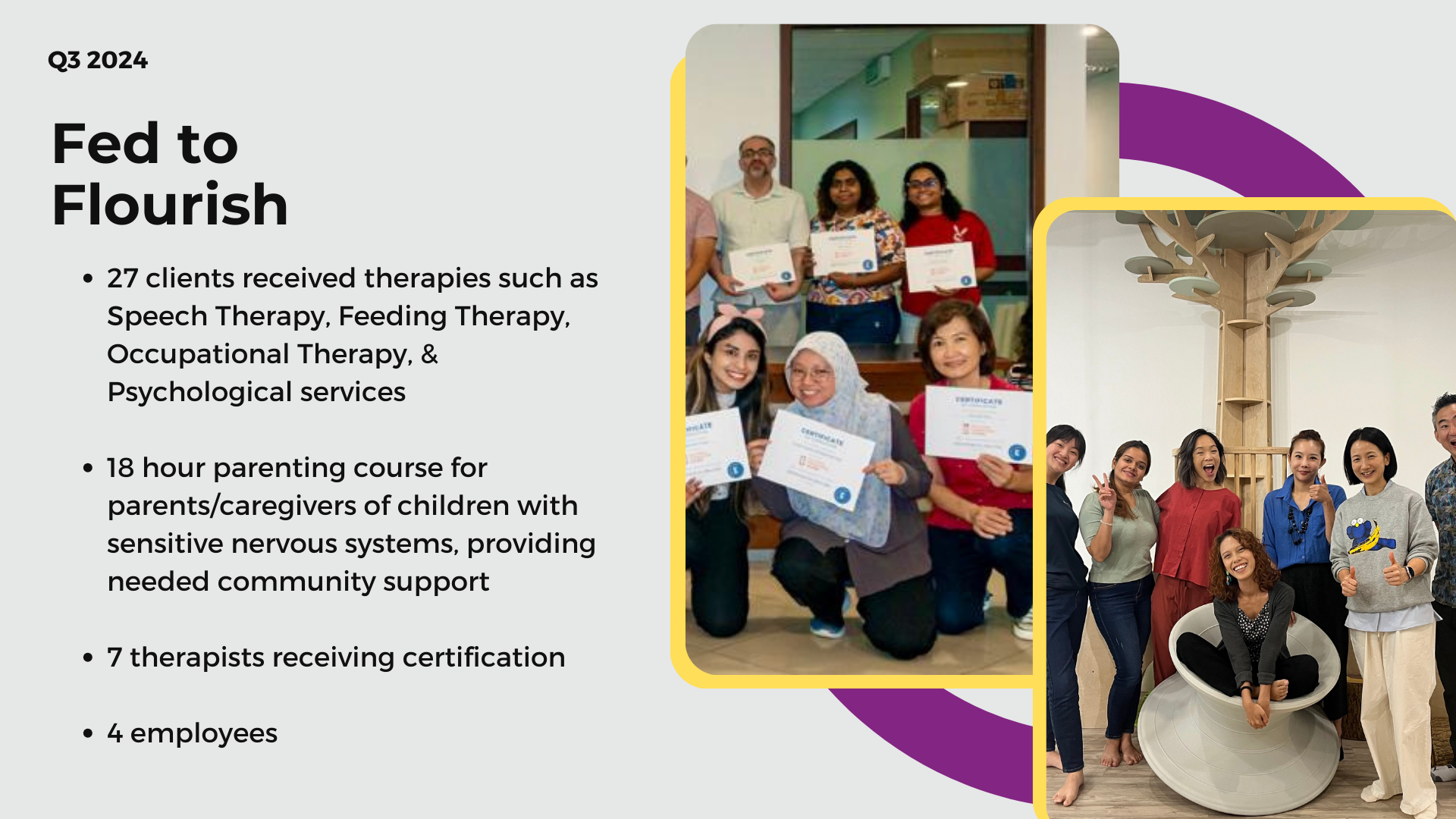Fed to Flourish
The Challenge
Malaysia is a diverse Southeast Asian nation known for its multicultural population (34 million), rich cultural heritage, and vibrant landscapes, ranging from bustling urban centers to serene rainforests and pristine beaches. It is classified as an upper middle-income country with a rapidly developing economy and a unique blend of traditional and modern influences.
In Malaysia, children often face significant barriers in accessing essential developmental therapy services. These obstacles stem from a combination of factors: parental denial or lack of awareness, the high cost of services, a shortage of trained therapists, and long waiting lists for qualified service providers. These challenges are particularly pronounced for the B40 community, the segment of the population living at the lowest income level in the country.
As a result, children with developmental delays frequently struggle to gain acceptance into schools, further exacerbating their difficulties. According to MyHealth, “So far only two public universities offer courses in the field of speech-language therapy for degree level. The number of new students for a university is very low, about 15-20 students in the past year. This is due to the lack of lecturers and facilities for clinical training.”
This scarcity of trained professionals is compounded by broader systemic issues. Despite Malaysia’s classification as an upper middle-income country, it has one of the lowest therapist-to-patient ratios globally, with only 0.2 therapists per 10,000 people (ejournal.um.edu.my). The occupational therapy sector, in particular, faces significant hurdles. As highlighted in a report from the University of Malaya, “The primary issues faced by Malaysian occupational therapy are a lack of university-based educational programmes, and human resources to proactively plan for and develop a greater quality workforce for its education, clinical and research sectors” (ejournal.um.edu.my).
Addressing these challenges requires concerted efforts to improve educational opportunities for therapists, increase awareness among parents, and make services more affordable and accessible to all segments of the population, especially the most vulnerable.
A Solution
Fed to Flourish aims to transform the lives of children and their caregivers in Malaysia by offering essential developmental services. Their comprehensive range includes feeding therapy, speech therapy, occupational therapy, clinical psychology, and parent support courses. By employing local professionals and training new graduates, they not only ensure quality care but also foster inclusive economic growth. Child developmental services are not covered by insurance, therefore only the top income earners can afford regular services for their children.
Additionally, most Malaysian children are currently underserved due to barriers like parental unawareness, prohibitive costs, therapist shortages, and lengthy waitlists, with the B40 community disproportionately affected. Their vision is for families to thrive through empowering children and supporting parents, while their mission centers on providing compassionate, judgment-free spaces where families facing developmental and relational challenges can access crucial services.
Business Activities Geared Towards Good Health, Quality Education, Decent Work and Economic Growth, and Reducing Inequalities:
Target 3.P.1: Promote high quality health services through teaching medical techniques and/or providing medical training seminars for other medical professionals and communities.(Created for PRINT)
Target 4.P.1: Work towards ensuring that all girls and boys complete free, equitable and quality primary and secondary education leading to relevant and effective learning outcomes ADAPTED: Work towards ensuring that individuals have access to quality education leading to relevant and effective learning outcomes.
Target 8.3: Promote and support productive activities, decent job creation, entrepreneurship, creativity and innovation, and encourage the formalization and growth of micro-, small- and medium-sized enterprises, including through access to financial services
Target 10.P Empower and promote economic inclusion for all, irrespective of age, sex, disability, race, ethnicity, origin, religion or economic or other status.
Measured by:
Number of individuals who received therapy offered by the organization each quarter (caregivers/children)
Number of total clients served/trained each quarter
Number of full-time, part-time, and temporary employees of the organization that are earning a local living wage or higher as of the end of the quarter.
Number of total clients from the B40 community served.
Types of services provided
Fed to Flourish aims to transform the lives of children and their caregivers in Malaysia by offering essential developmental services. Their comprehensive range includes feeding therapy, speech therapy, occupational therapy, clinical psychology, and parent support courses. By employing local professionals and training new graduates, they not only ensure quality care but also foster inclusive economic growth. Child developmental services are not covered by insurance, therefore only the top income earners can afford regular services for their children.
Additionally, most Malaysian children are currently underserved due to barriers like parental unawareness, prohibitive costs, therapist shortages, and lengthy waitlists, with the B40 community disproportionately affected. Their vision is for families to thrive through empowering children and supporting parents, while their mission centers on providing compassionate, judgment-free spaces where families facing developmental and relational challenges can access crucial services.


What Does Your Donation Go Towards?
Subsidized intervention services for B40 Community (bottom 40% of social economic class) - $130 per child per month for Speech Therapy, Occupational Therapy, Feeding Therapy
Trainings and certifications for local therapists
Speech/Occupational/Psychological Therapy Assessment Tools - $1000 - $3000








